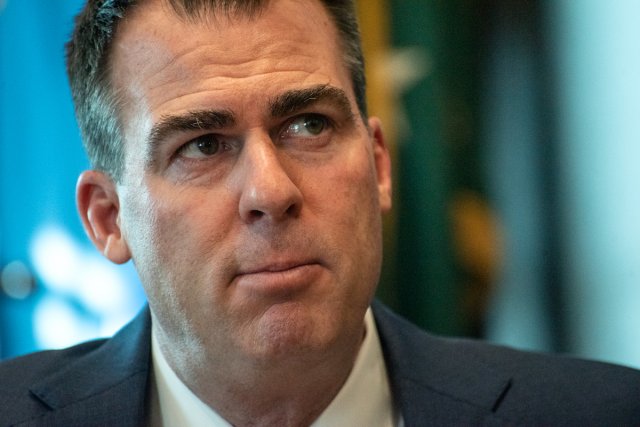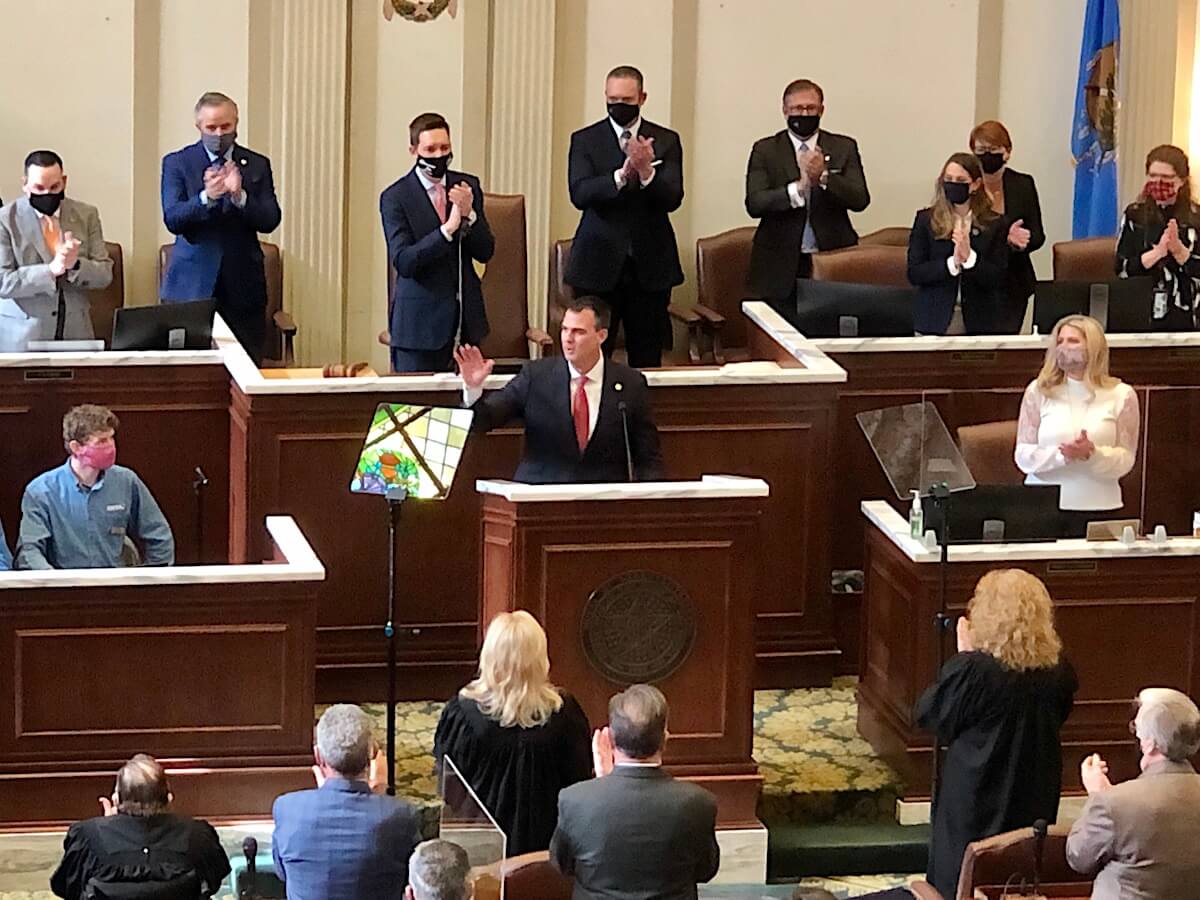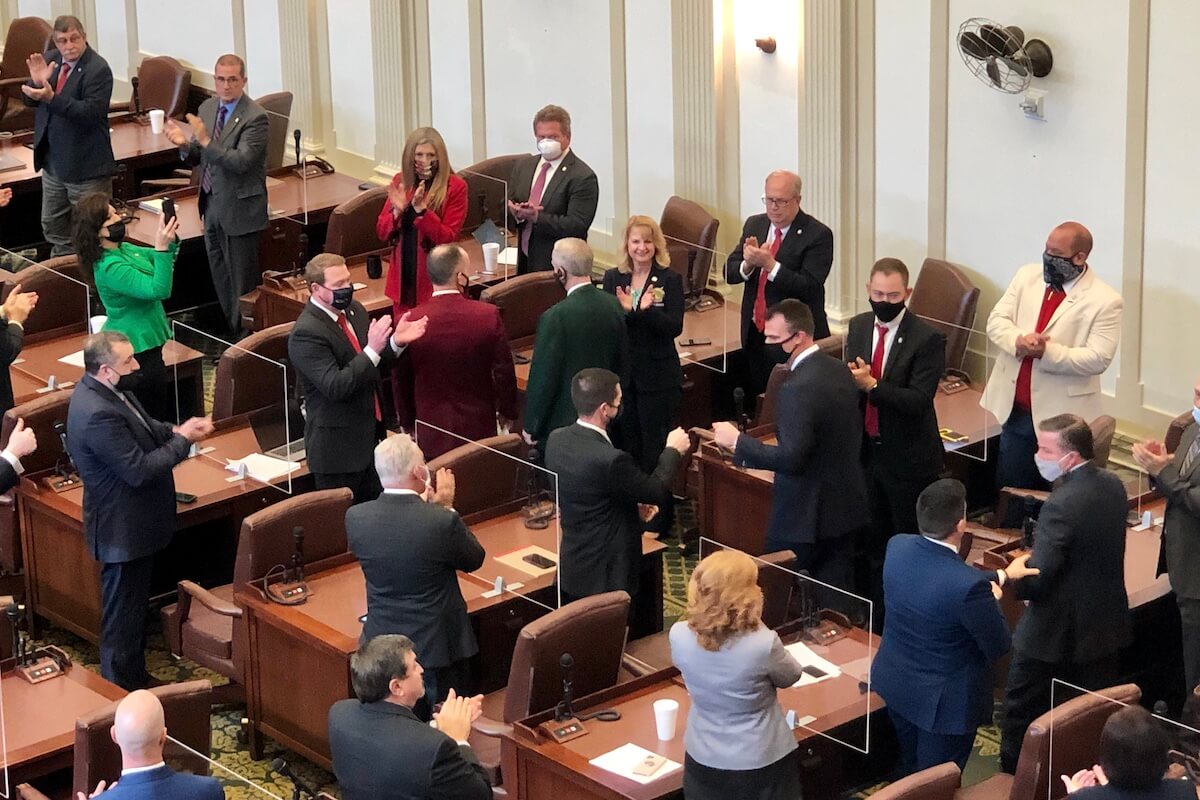
With his 2020 efforts to consolidate and streamline state government derailed by the coronavirus pandemic, Oklahoma Gov. Kevin Stitt used his annual State of the State address today to push some of the same narrative he did a year ago, but he also pitched changes to the state education funding equalization formula, promoted his Medicaid managed care effort and called for unity in the wake of the U.S. Supreme Court decision involving eastern Oklahoma Indian reservations.
Overall, Stitt again focused on optimism even as he called for changes to the state employee classification system, critiqued Tulsa Public Schools’ lack of in-person instruction options and acknowledged that more than 3,000 Oklahomans have died from COVID-19.
“The state of our state is strong because we are resilient and well-positioned for a bright future,” Stitt said. “(…) The pandemic isn’t over — but we can see the light at the end of the tunnel. As Will Rogers once said, ‘Don’t let yesterday use up too much of today.'”
As he has two years in a row, Stitt called for prudent and conservative budgeting, asking lawmakers to make targeted investments and a deposit into nearly depleted state savings accounts. The Revenue Stabilization Fund currently contains about $171 million, and the Constitutional Reserve Fund (known as the Rainy Day Fund) contains about $58 million. Both numbers are down significantly after lawmakers spent hundreds of millions of dollars propping up crumbling state budget pillars nearly one year ago.
Stitt, of course, does not author the state budget. The governor’s proposed executive budget (embedded below) serves as a desired framework for lawmakers to consider, but legislative leaders do not have to heed the governor’s requests, as Stitt learned last year when the House and Senate overrode his veto of a budget he said needed more cuts.
This year, Oklahoma Chief Operating Officer John Budd told media early Monday morning that Stitt had already met a couple of times with Senate President Pro Tempore Greg Treat (R-OKC) and House Speaker Charles McCall (R-Atoka) to discuss priorities.
“It’s not that we have an exact list that matches across all of the entities, but at least we’re starting to work together ahead of session more so than the prior years,” Budd said.
Secretary of State and Chief Policy Advisor Brian Bingman concurred, saying the Stitt administration is seeking a unified “people’s agenda” between the executive and legislative branches.
“We honestly had a rough session last year with how things ended,” Bingman said. “So we made a concerted effort to get together and push the reset button. And I think we’re all on the same page, and philosophically we are all in agreement.”
Recruiting businesses during the pandemic

Stitt spent a significant portion of his speech promoting his decisions in 2020 that reopened Oklahoma’s economy more quickly than other states, and while he noted a recent decline in COVID-19 infection numbers, the state has still been among the leaders in the nation for community spread in recent months.
Still, Stitt discussed how his administration has been recruiting businesses and business leaders to move to Oklahoma from places like California, an endeavor he said is made easier by the Governor’s Quick Action Closing Fund. In his proposed executive budget, Stitt wants $20 million for that fund, which allows him to offer incentives that strengthen the appeal of economic development deals in Oklahoma.
“Over the last year, I’ve worked together with the Department of Commerce and the Oklahoma Business Roundtable to get those companies free from California’s anti-business policies,” Stitt said. “PAS MRO, an aerospace company based in California, announced last summer it would be moving its operations to Bristow, Oklahoma. Company President Jim Agee said the decision was easy. He said it was because of Oklahoma’s business-friendly policies, availability of highly trained workers and the lower costs of doing business in our state. One of our key tools we have in Oklahoma to close deals like these is the Governor’s Quick Action Closing Fund. It lets us recruit new industries and growing companies.”
Stitt also referenced his request for $50 million in appropriations to the Department of Commerce to fund “accelerator” programs.
“We also need to invest in innovation by using accelerators for entrepreneurs and supporting startups statewide,” he said.
Stitt: Education funding reform an ‘opportunity’

Stitt also said 2021 presents “the opportunity of a lifetime” and “a chance to rethink and reimagine the future of education in Oklahoma.”
“One of the ways we can do this is by looking at how schools get their funding. The current formula lets schools pick their highest number of students over the last three years,” Stitt said. “Here’s what that means. Say you lived in Tulsa and moved to a new district to make sure your kids could go to school in person. Your kids could be counted by both districts.”
Stitt referred to such enrolled individuals as “ghost students,” and he said Oklahoma currently has “more than 55,000 ghost students in our funding formula,” though the source of that figure was not immediately clear.
“This is unacceptable,” Stitt said. “It’s time for schools to be funded based on how many students they have now — not how many they had in the past.”
Stitt was referring to legislation expected to be run this session to change the education funding formula and potentially move away from funding districts based on their highest enrollment over the past three years.
The governor also continued his criticism of Tulsa Public Schools’ decision not to offer in-person instruction options while other Tulsa-area districts have:
By not giving our parents and children an option for in-person learning, schools have tied their hands. It’s now been 325 days since Tulsa students in 4th through 12th grades have been allowed to be in their classrooms. (That is) 325 days.
Meanwhile, just a few blocks away, the rest of the Tulsa metro has been safely in session most of the year. Union, Jenks, Broken Arrow, Bixby, Owasso, Sapulpa, Sand Springs, Sperry, Skiatook, Collinsville. The list goes on. They’ve all found ways to put their students first and give them the choice to come back to the classroom.
The only difference between schools that stay closed and those that have safely reopened is the mindset to find a way to make it happen.
Third-party managed Medicaid fight brewing
Stitt also attempted to build support for what, so far, has been his signature health care effort: the implementation of third-party Medicaid managed care.
“With Medicaid Expansion now in our Constitution, this is the perfect opportunity to reimagine health care delivery in Oklahoma. It’s time to focus on outcomes and not just paying invoices,” Stitt said. “Forty states have found managed care is the best way forward: Texas, Kansas, Iowa, Tennessee, Florida. Even California and Illinois. It’s not a red state or blue state thing. It’s the smart thing to do. In fact, every other state with Medicaid expansion also uses managed care.”
But many lawmakers have expressed skepticism of Stitt’s private managed care plan, and it is unclear whether the Legislature may attempt to pass a law functionally blocking its implementation. For now, the Oklahoma Health Care Authority has already announced contracts with four private entities to provide care management services.
The governor’s claims about other states’ successes with third-party Medicaid managed care are also likely to be questioned. In Kansas, for instance, providers reported problems with reimbursement processes.
‘The most pressing issue’
Stitt closed by referring to uncertainty over the impact of McGirt v. Oklahoma, calling the U.S. Supreme Court decision “the most pressing issue for our state’s future.”
“This ruling also raises many other unanswered questions. Do tribal members living in eastern Oklahoma pay income tax and sales tax? If not, the Oklahoma Tax Commission estimates a potential loss of $200 million every year,” Stitt said. “Another potential issue is who regulates agriculture? Water? The energy industry? Zoning? Who has the right to tax businesses?”
Stitt has empaneled a Commission on Cooperative Sovereignty to offer recommendations for unifying the state on those questions, but negotiations about potential federal legislation on the topic have mostly occurred in private.
“I’ve invited the leaders of Oklahoma’s sovereign tribes to join together and work with the State of Oklahoma. Together, we must create the certainty, fairness and the unity we’ve enjoyed since 1907,” Stitt said. “Where we go from here will define the state’s future. We have a shared responsibility to live as one Oklahoma regardless of your race or where you live. We drive on the same roads; our kids go to the same schools and we benefit from the same programs. It is critical — while embracing the tribal heritage of many Oklahomans — that we don’t lose sight of the fact that we are all Oklahomans.”
Board of Equalization meeting looms
The Board of Equalization will certify a final revenue picture at its 10 a.m. Tuesday, Feb. 16, meeting. That certification will provide the Legislature with an upper boundary for its appropriation authority for Fiscal Year 2021-2022.
Stitt’s proposed executive budget is embedded below. It includes a requested increase in the per diem reimbursement for CoreCivic, a private prison operator that runs a correctional facility in Cushing.
 Loading...
Loading...
Responses to Stitt’s third State of the State address
Oklahoma Public Employees Association director Sterling Zearley quickly distributed a statement in response to Stitt’s State of the State pitch for a change to how state employees are classified and promoted.
“While state employees are pleased Gov. Stitt recognizes changes must be made to allow more promotional opportunities for state employees, OPEA was disappointed that he excluded bringing Oklahoma’s state employee compensation closer to market,” Zearley said. “He mentioned the need for a pay-for-performance incentive program to reward good state employees but did not say how to reward good employees except through promotions. State employees who serve every day should not have to take another job just to get better pay, but that is the case right now.”
House Speaker Charles McCall (R-Atoka) praised Stitt.
“Gov. Stitt’s leadership has Oklahoma positioned for big success this session,” he said. “The governor will find strong support in the House for keeping the economy open, resuming in-person school, empowering parents and improving school finances. On those and all other issues, we appreciate and will reciprocate the governor’s pledge to work together and have a productive session for all Oklahomans.”
Senate President Pro Tempore Greg Treat (R-OKC) also issued a statement praising the governor.
“I appreciate the optimism of Gov. Stitt’s state of the state speech. Senate Republicans are ready to work with the governor and our House colleagues to help Oklahoma rebound from the COVID-19 pandemic, grow and diversify our economy, help state government deliver services more efficiently to taxpayers, and invest in the people of Oklahoma,” Treat said. “I appreciate the governor’s acknowledgement of the constitutional authority of each branch of government and look forward to working with him as the session progresses.”
Senate Minority Leader Kay Floyd (D-OKC) said Stitt’s speech affirmed what her caucus has been saying: that the state’s top priority right now should be dealing with COVID-19. But she also criticized the governor’s third-party Medicaid managed care effort.
“We continue to be concerned with the process through which the governor is implementing a managed care system for the state’s Medicaid program,” Floyd said. “Converting Medicaid delivery to managed care is a $2.2 billion endeavor, yet there has been very little input from the Legislature and from the medical community. It is especially troubling this process, which is a major change to our state’s health care system, is being rushed through as our state’s hospitals and medical providers are on the front lines treating Oklahomans with COVID-19.”
Chickasaw Nation Gov. Bill Anoatubby also released a statement in response to Stitt’s speech, saying he supports compacts between Oklahoma and tribal nations regarding the criminal justice issues posed by the McGirt decision.
“We remain committed to working with the state, the attorney general and the Oklahoma Legislature to form durable agreements that serve the interests of all Oklahomans. We support federal action to authorize compacting on tribal-state criminal jurisdiction. We would welcome support from the state for such narrow federal action,” Anoatubby said. “We have a long history of working closely with the State of Oklahoma to address significant challenges and develop solutions for the benefit all Oklahomans. Given our history, we believe good faith negotiations based on an accurate evaluation of the facts offer a productive path forward. We look forward to working together in a manner that respects tribal, state and federal sovereignty.”
State Superintendent of Public Instruction Joy Hofmeister said the numbers Stitt used to discuss “ghost students” did not come from the Oklahoma State Department of Education.
“We are interested in learning more about the Governor’s plan. The education funding formula is in statute and not a choice of districts, rather a state law,” Hofmeister said. “Our focus is on ensuring students have the supports and resources they need, especially in times of great instability.”
Members of the House Democratic Caucus held their official response to Stitt’s State of the State address at 3 p.m. outside of a hospital in Oklahoma City. House Minority Leader Emily Virgin (D-Norman) said that while Oklahoma’s coronavirus numbers have gone down recently, Stitt engaged in “revisionist history” in his speech.
“As COVID-19 rages in Oklahoma, January was our worst month yet. No state wishes they would have responded to this pandemic the way that Oklahoma has,” Virgin said. “Gov. Stitt’s response to this pandemic has been an example of failed leadership.”
Virgin said Stitt has misrepresented statistics, set unrealistic expectations and done other things to “keep the truth from the public and hide the facts during the pandemic.”
(Update: This story was updated in the 2 p.m. hour of Monday, Feb. 1, to include quotes from McCall, Floyd, Anoatubby, Treat and Hofmeister. It was updated at 3:25 p.m. to include comments from Virgin.)





















